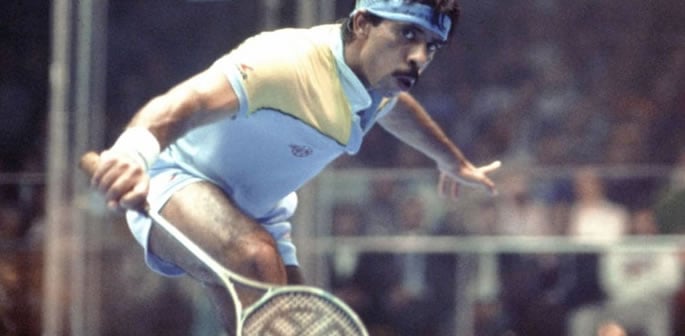"I knew I had no other choice but to persevere"
Jahangir Khan is not just a name in the world of squash; he is the benchmark for unparalleled dominance and unwavering resilience.
From the moment he burst onto the scene as a 17-year-old world champion to his record-breaking unbeaten streak, the Pakistani squash star redefined what it means to excel in sport.
Considered the greatest squash player of all time, Jahangir Khan enjoyed a lot of success throughout his career.
But his journey was marked by physical challenges, mental fortitude and sheer brilliance.
Khan transformed squash from a niche game into a stage for one of the greatest sporting legacies ever written.
We explore how Jahangir Khan set new standards of excellence and carved his name into history.
Early Life

Born on December 10, 1963, in Karachi, Jahangir Khan grew up in a family of squash players.
His father, Roshan Khan, claimed the prestigious British Open title in 1957, and his older brother, Torsam Khan, was a respected professional player in the sport.
But Khan’s early years suggested he might not follow in his family’s footsteps.
Struggling with a severe hernia, doctors doubted his ability to endure the physical demands of squash, deeming him too frail for such a gruelling sport.
He recalled:
“He cautioned my father – keep him away from the courts!”
“Under no circumstances should I be allowed to play squash, the doctor warned, as any attempt to play the sport would be detrimental to my health and wellbeing.”
Jahangir Khan underwent two surgeries, the first at the age of five and the second at 12, to correct his hernia.
His squash training began under the watch of his father and then his brother.
Khan’s natural talent for squash was evident and he quickly rose up the ranks in the domestic and junior circuits.
Facing his 1st Challenge

Jahangir Khan was not considered for the team event at the 1979 World Championships in Australia because Pakistan did not want to change their team setup.
But he entered the World Amateur Individual Championship.
At just 15, Khan became the youngest squash player to win the coveted title.
However, just a few months after announcing himself on the world stage, the teenager faced the biggest challenge of his life.
Khan’s older brother and coach Torsam suddenly passed away at the age of 27 after suffering a heart attack during a tournament match in Australia.
Jahangir Khan said: “This was a very difficult time for our family.
“It was shocking for us, and for me, it was a time when I told myself I did not want to continue playing competitive squash.”
He stayed away from the sport for months but Khan returned to honour his brother’s memory.
“I was hurting and so alone at times I would cry, but deep down inside I knew I had no other choice but to persevere for the honour of my brother.”
Becoming the Youngest Squash World Champion

Now coached by his cousin Rahmat Khan, Jahangir Khan went on to achieve unprecedented heights in the game.
In 1981, 17-year-old Jahangir Khan reached a career milestone by defeating Australia’s Geoff Hunt to claim the World Open title, breaking Hunt’s dominance in the tournament.
This victory made Khan the youngest world champion in squash history and marked the beginning of an extraordinary chapter in the sport.
What followed was an unparalleled winning streak, widely regarded as one of the greatest in any sport.
From 1981 to 1986, Jahangir remained undefeated in 555 consecutive matches, a feat recognised by the Guinness World Records as the longest winning streak in top-level professional sports.
During this period, he claimed five consecutive World Open titles (1981–1985) and solidified his legacy as an all-time great.
Khan’s remarkable run finally ended in the 1986 World Open final in Toulouse, where New Zealand’s Ross Norman emerged victorious.
After this rare defeat, Khan rebounded with another nine-month unbeaten streak, further cementing his place as a legend in the game.
Continued Success

After the end of his golden streak, Jahangir Khan won his sixth and final world title in 1988, defeating countryman Jansher Khan.
He reached the final in 1991 and 1993, losing to Rodney Martin and Jansher Khan.
When it comes to the World Open, only Jansher Khan (eight) has more titles than Jahangir Khan.
Meanwhile, Jahangir Khan’s record at the British Open remains unmatched.
His 10 successive victories between 1981 and 1991 make him the most successful player in the tournament’s history.
Khan, who was the number one ranked player for 94 months between January 1982 and April 1992, retired from professional play in 1993.
His illustrious career culminated with Pakistan’s victory in the World Team Championship, fittingly held in his hometown of Karachi.
Even after retirement, Khan remained deeply connected to squash, taking on prominent administrative roles.
He notably served as President of the World Squash Federation from 2002 to 2008, continuing to influence the sport at the highest level.
Khan’s extraordinary achievements have earned him global recognition.
The Government of Pakistan honoured him as the “Sportsman of the Millennium”, while the United Nations acknowledged him as one of the greatest athletes of the past 1,000 years.
Legacy

After retiring, Jahangir Khan became a vocal advocate for squash, using his iconic status to draw attention to the sport’s potential.
He championed efforts to modernise the game, including advancements in technology, media coverage, and player welfare.
His dedication to the sport extended to mentoring young players and supporting grassroots initiatives to grow squash in underrepresented areas.
Khan’s success brought immense pride to Pakistan, inspiring generations of athletes in his home country and beyond.
He became a symbol of resilience, proving that physical limitations could be overcome through determination and discipline.
In 2024, Khan and Susan Devoy were the first inductees into the Professional Squash Association (PSA) Hall of Fame.
He said: “It’s an honour. You play for many years and receive many awards, but something like this is recognition for your hard work and for what you have done for the game as well.
“It’s an incredibly big privilege.”
Jahangir Khan’s legacy transcends the boundaries of squash, serving as a timeless example of how dedication, perseverance, and an unrelenting drive for excellence can reshape an entire sport.
From his awe-inspiring dominance on the court to his tireless efforts to elevate squash globally, Khan’s impact remains unmatched.
His story is a reminder that true greatness is not just about winning – it’s about breaking barriers, inspiring generations, and leaving a legacy that stands the test of time.
Jahangir Khan didn’t just redefine excellence in squash; he set a standard for all athletes to aspire to, ensuring his name will forever be synonymous with greatness.






























































